Select Language
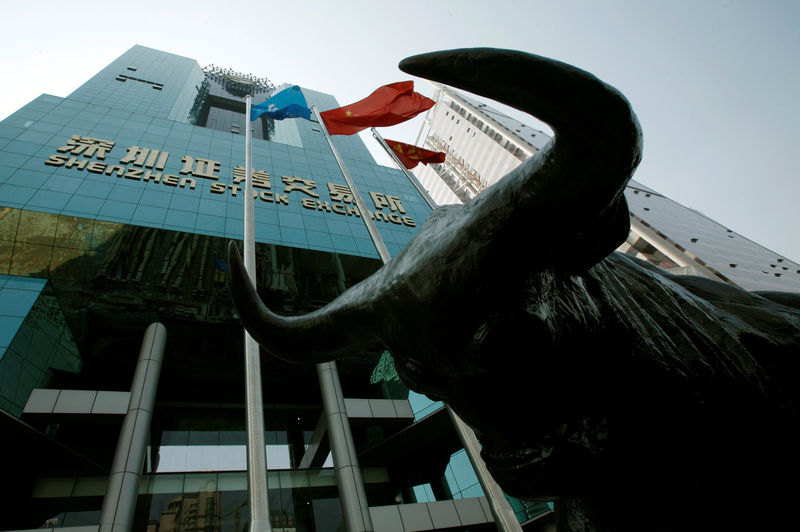
Asian fund managers are showing renewed confidence in Chinese equities while maintaining Japan as their top market preference, according to a Bank of America (BofA) survey.
BofA analysts said that optimism toward China has surged to its highest level in years, with a record number of investors no longer viewing the market as structurally bearish.
This shift comes as expectations rise for increased household spending and investment rather than cash hoarding, analysts said in a note.
Meanwhile, Japan remains the most favored market, although enthusiasm has moderated. A net 59% of participants expect a stronger Japanese economy in the next 12 months, down from 73% last month, according to BofA.
Investors continue to focus on the Bank of Japan’s policy moves, foreign exchange fluctuations, and corporate reforms, BofA analysts stated.
"Japan is the most favored market, while China leapfrogged to occupy the second position. Thailand continues to be the least preferred market, with India, Indonesia, and Korea trailing closely behind," analysts wrote.
The survey also highlighted a shift in sector preferences, with fund managers overweight in software, telecom, banks, and tech hardware, while reducing exposure to real estate, materials, and utilities.
Support for semiconductors has waned, with a net 13% of investors expecting the cycle to weaken—the lowest reading since October 2022, BofA said.
BofA surveyed 205 fund managers overseeing $477 billion in assets between March 7-13.
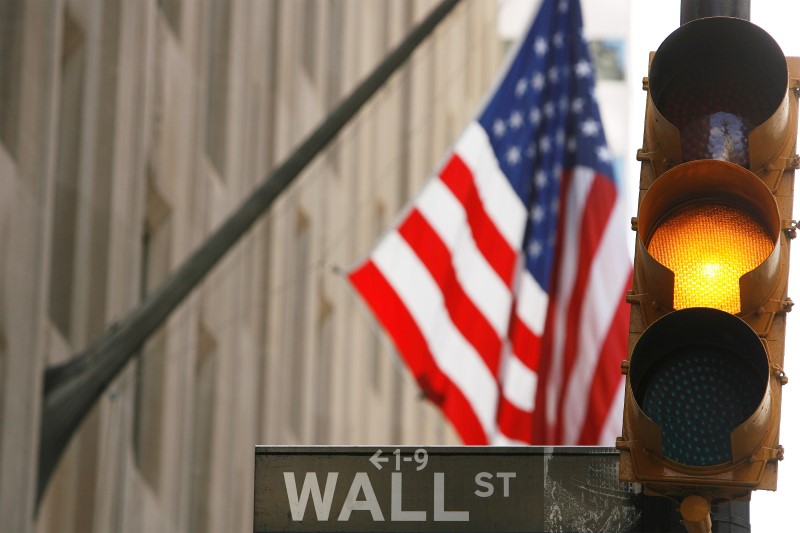
Investing.com-- U.S. stocks slumped Tuesday, ahead of the start of this week’s Federal Reserve meeting and Nvidia’s annual conference set to kickoff later today.
At 4:00 p.m. ET (20:00 GMT), the Dow Jones Industrial Average fell 257 points, or 0.6%, the S&P 500 index fell 1%, lower, and the NASDAQ Composite dropped 1.7%.
Fed kicks off two-day meeting
The Federal Reserve kicked off its two-day meeting Tuesday that is expected to culminate in an unchanged decision on rates.
But a lot of attention is likely to be on the publishing of new economic projections, which will offer investors the most tangible evidence yet of how U.S. central bankers view the likely impact of the Trump administration’s policies on the economy.
Some signs of cooling in the labor market could push the Fed into softening its hawkish stance, as could growing speculation over a U.S. recession.
Data released earlier Tuesday showed that U.S. single-family homebuilding rebounded sharply in February, but rising construction costs from tariffs and labor shortages threaten the recovery.
Single-family housing starts, which account for the bulk of homebuilding, surged 11.4% to a seasonally adjusted annual rate of 1.108 million units last month. Data for January was revised to show homebuilding declining to a rate of 995,000 units instead of the previously reported pace of 993,000 units.
Trump, Putin agree to seek limited ceasefire on energy and infrastructure
Investing.com -- The White House said Tuesday that US President Donald Trump and Russian President Vladimir Putin agreed to seek a limited ceasesire on energy and infrastructure targets for 30 days.
"The leaders agreed that the movement to peace will begin with an energy and infrastructure ceasefire, as well as technical negotiations on implementation of a maritime ceasefire in the Black Sea, full ceasefire and permanent peace," according to a readout of President Donald J. Trump’s call with President Vladimir Putin on Tuesday.
“These negotiations will begin immediately in the Middle East,” the White House said.
Nvidia’s CEO Huang talks up strong AI demand ahead; Tesla continues selloff; Alphabet to acquire Wiz
In the corporate sector, Nvidia (NASDAQ:NVDA) CEO Jensen Huang talked up rising AI use cases including agentic AI that will fuel the next leg growth for chip demand.
"The amount of computation we need as a result of agentic AI, as a result of reasoning, is easily 100 times more than we thought we needed this time last year," Huang said in his keynote address at the chipmaking giant’s GTC conference in California.
Tech bulls on Wall Street welcomed the remarks from Huang on strong Nvidia demand.
"Demand for NVDA GPUs remains extremely robust where we believe demand is currently outstripping supply 15:1 with more enterprises waiting their turn in line to receive the most advanced AI chips on the market," Wedbush said in a note.
The chipmaker nursed heavy losses over the past month, as broader market sentiment soured, and as investors questioned just how much strength there remained in the AI trade amid increased market turmoil. Nvidia’s stock was down about 20% from its January record high.
Adobe Systems (NASDAQ:ADBE) executives are expected to provide more insight into their AI strategy during a meeting with analysts at the Photoshop-owner’s digital experience conference.
Tesla Inc (NASDAQ:TSLA), meanwhile, fell more than 5% taking total losses for the month so far to around 24% as rising competition is expected to hurt the EV maker’s sales. RBC cut its price target on the company, citing expectations for the company to cut its self-driving software.
Alphabet Inc Class A (NASDAQ:GOOGL) fell more than 2% after agreed to acquire cybersecurity start up Wiz for around $32B.
(Peter Nursesrtocks Ambar Warrick contributed to this article.)

TOKYO (Reuters) - Japan’s land prices rose at their fastest pace in 34 years in 2024 with recovery spreading to regional areas thanks to sustained economic growth, in the latest sign of a pickup in the property market, a government survey showed on Tuesday.
Average nationwide land prices, across residential and commercial, grew 2.7% as of January 1, the fourth straight year of gains, the land ministry survey showed.
It was the fastest pace since 1991, before land prices began a long decline in the wake of the bursting of the asset "bubble".
"Japan’s overall land prices continued its rising trend amid a moderate economic recovery," the land ministry said.
Gains in land prices were helped by the surge in inbound tourism, which boosted demand for hotels and shops. In about 64% of plots surveyed land prices exceeded the level in 2020 before the pandemic, the ministry said.
But there were some concerns in the market about the potential impact from higher construction costs and more interest rate hikes by the Bank of Japan, the survey found.
The central bank raised the cost of borrowing in July last year after abandoning a years-long radical monetary stimulus programme that was imposed to boost sluggish consumer demand. The central bank hiked rates again to 0.5% in January this year and has signalled a readiness to keep tightening if wages continue to increase.
"There were some voice of concerns about the outlook due to higher construction costs and expectations of higher interest rates," said a land ministry official.
The survey showed both residential and commercial land prices grew for the fourth consecutive year.
Residential land prices grew 2.1% driven by sustained demand for housing in a low interest rate environment. Areas with good transport links attracted many buyers, while in resort and tourist areas foreigner-targeted condominium and local housing also saw strong demand.
Commercial land prices grew 3.9% as popular tourist destinations such as Kyoto and Osaka showed continued increases as Japan welcomed a record number of foreign visitors in 2024. Regions undergoing redevelopment projects also saw continuing growth in land prices, the ministry said.
Areas with semiconductor plants such as Chitose city on the northern island of Hokkaido and Kikuyo town in southern Kumamoto prefecture, showed rises in land prices due to robust demand for housing and offices.
Land prices in industrial areas climbed 4.8%, up for the ninth year in a row, helped by the development of large-scale logistics facilities for e-commerce market.
Japan’s three major metropolitan areas surrounding Tokyo, Osaka and Nagoya showed a 4.3% gain in land prices, up for the fourth straight year. Those of the four major regional cities of Sapporo, Sendai, Hiroshima and Fukuoka rose 5.8%, up for the 12th straight year but slower than in 2023 as rising construction costs weighed.
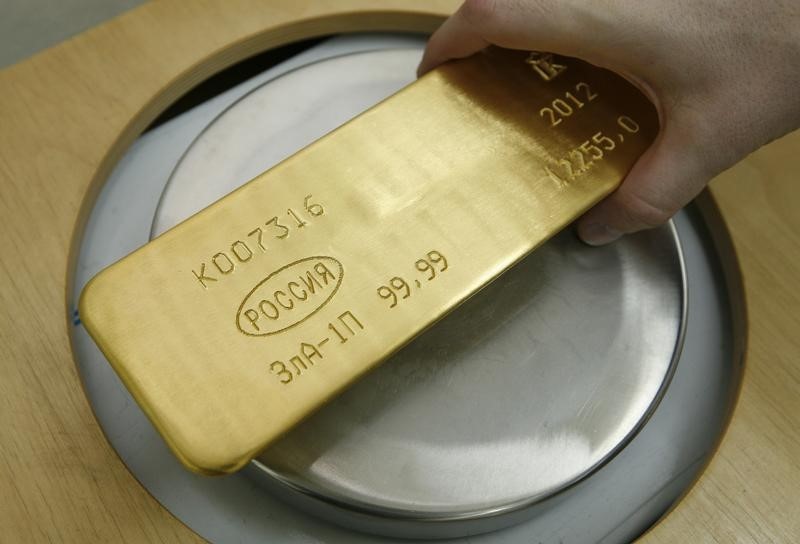
Gold prices hit a record high in Asian trade on Tuesday as heightened geopolitical ructions in the Middle East- particularly the breaching of an Israel-Hamas ceasefire- fueled safe haven demand.
Safe haven demand also remained underpinned by persistent uncertainty over U.S. President Donald Trump’s trade tariffs and a cooling U.S. economy. Anticipation of a slew of key central bank meetings this week also kept investors geared towards safe havens.
Spot gold rose 0.2% to a record high of $3,008.56 an ounce, while gold futures expiring in May hit a peak of $3,017.50 an ounce.
Israel launches attacks against Hamas target in Gaza, ceasefire talks fail
A slew of media reports said Israel had launched strikes against Hamas targets across Gaza after talks over a ceasefire fell through. The strikes reportedly killed over 40 people, including senior Hamas officials, and drew ire from the group, which accused Israel of violating a January ceasefire.
Israel and Hamas had agreed to a tentative ceasefire in mid-January. But talks over a more concrete peace treaty had soured amid disagreements over the terms of the ceasefire, while U.S. delegates were also unable to broker peace.
Israel claimed the strikes were in retaliation for Hamas’ repeated refusal to release Israeli hostages.
Tuesday’s strikes mark a renewal in tensions in the Middle East, further underpinning safe haven demand for gold, keeping spot prices at record highs above the $3,000 an ounce level.
Fed anticipation, tariff uncertainty underpin gold
Gold also benefited from haven demand amid persistent uncertainty over Trump’s tariff plans, especially as his main targets- Europe, China, Canada, and Mexico- announced a slew of retaliatory measures.
Trump repeated his threat that reciprocal and sectoral tariffs will come by as soon as April 2. Concerns over economic disruptions from the tariffs drummed up fears of a U.S. recession.
A Fed meeting is now in focus for more economic cues, with the central bank widely expected to keep rates unchanged at the conclusion of a two-day meeting on Wednesday. But the central bank is expected to taper its hawkish outlook in the face of heightened economic uncertainty.
Beyond the Fed, Bank of Japan and Bank of England meetings are also on tap this week.
Other precious metals rose tracking gold on Tuesday, with platinum futures up 0.4% at $1,030.20 an ounce, while silver futures rose 0.5% to $34.480 an ounce.
Among industrial metals, benchmark silver futures on the London Metal Exchange rose slightly to $9,867.20 a ton, while May copper futures rose 0.1% to $4.9850 a pound.
Copper prices were buoyed by optimism over more stimulus measures in top importer China.
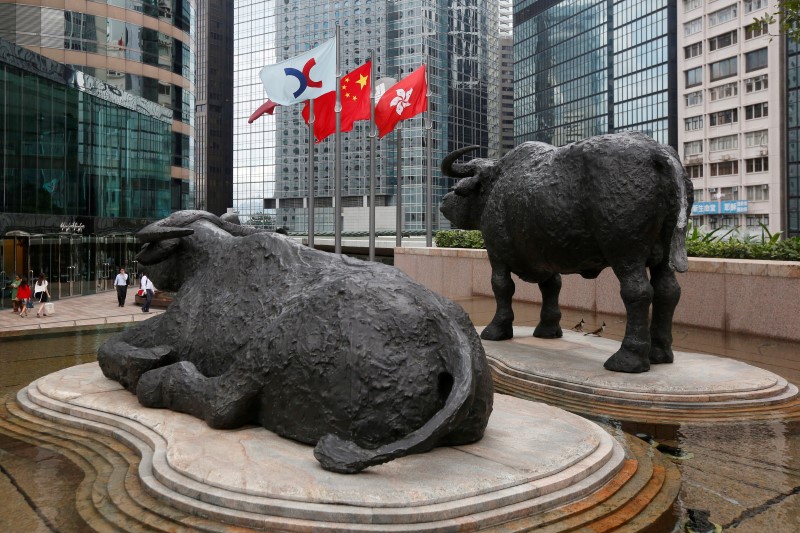
Investing.com-- Most Asian stocks rose on Tuesday, with Hong Kong markets rallying on increasing optimism over more Chinese stimulus, while confidence in the country’s AI capabilities drove buying into major technology shares.
Japanese shares were also standout performers, with the country’s five largest trading houses marking strong gains after billionaire investor Warren Buffett’s Berkshire Hathaway Inc (NYSE:BRKa) increased its holdings in the companies.
Broader regional markets tracked overnight strength in Wall Street, as a mix of bargain buying and some signs of economic resilience helped U.S. stocks rise further out of correction territory.
But U.S. stock index futures fell in Asian trade, as investors remained skittish over more trade tariffs and a potential recession. Anticipation of a Federal Reserve meeting- which begins later on Tuesday- also sparked caution.
Risk appetite was dented by heightened geopolitical tensions in the Middle East, after Israel launched a wave of deadly strikes against Hamas amid the apparent collapse of a January ceasefire.
Hong Kong soars on AI hype, China stimulus cheer
Hong Kong’s Hang Seng index was the best performer in Asia, rallying nearly 2% to three-year highs on buying into heavyweight technology stocks.
Baidu (NASDAQ:BIDU) Inc (HK:9888) soared 10% after the company launched two new AI models, including one which it claimed rivaled DeepSeek- which has become a hot topic for the AI industry.
Alibaba (NYSE:BABA) Group (HK:9988) rose more than 4% after the e-commerce giant, led by CEO Eddie Wu, told its major divisions that their 2025 performance will be gauged largely by their ability to leverage AI for future growth, according to a Financial Times report. The report highlighted a growing focus on AI within the e-commerce giant.
Gains in Baidu and Alibaba spilled over into other technology stocks, given that their efforts highlighted growing interest and confidence in China’s AI capabilities.
Among other tech majors, BYD Co (HK:1211) soared to a record high after the electric vehicle giant and Tesla (NASDAQ:TSLA) rival launched a new fast-charging technology which it claimed could recharge EVs in a matter of minutes.
Outside tech, broader Hong Kong and Chinese markets advanced after Beijing revealed more details on its plans for stimulus, drumming up confidence in a 2025 economic recovery.
The mainland Shanghai Shenzhen CSI 300 and Shanghai Composite indexes added 0.3% and 0.2%, respectively.
Australia’s ASX 200 rose 0.2%, also buoyed by optimism over major trading partner China. South Korea’s KOSPI added 0.3%, while Singapore’s Straits Times index surged 0.9%.
Japan stocks buoyed by Berkshire increasing trading houses stakes
Japan’s Nikkei 225 index jumped 1.6%, while the TOPIX index added 1.5%.
The two were boosted chiefly by standout gains in Japan’s five biggest trading houses- Itochu Corp. (TYO:8001), Mitsui & Co., Ltd. (TYO:8031), Mitsubishi Corp. (TYO:8058), Sumitomo Corp. (TYO:8053), and Marubeni Corp. (TYO:8002)- after Berkshire Hathaway increased its holdings in each company to nearly 10%. Buffett has repeatedly endorsed the five companies, and has flagged plans to increase his holdings.
Focus in Japan was squarely on a Bank of Japan meeting, with the central bank widely expected to keep rates unchanged on Wednesday. But it is also expected to strike a hawkish chord on recent signs of resilience in Japanese inflation and the economy.
Among other Asian markets, futures for India’s Nifty 50 index pointed to a positive open, with the index widely expected to track gains in its regional peers.

(Reuters) - Gold prices scaled a record peak above the key $3,000 mark on Tuesday for the second time within a week, as investors sought cover from economic concerns fuelled by U.S. President Donald Trump’s tariff polices.
Spot gold prices hit a record high of $3,005.09 per ounce.
Historically considered a reliable store of value during times of geopolitical instability, gold has risen 14% so far this year. Since Trump took office in January, gold has hit a record high 14 times as trade tensions have led to growing safe-haven demand.
"With the price now reaching our long-held target of $3,000/oz, the main question is whether the rally will continue. We think so, as long as policy risks and an intensifying trade conflict continues to spur safe-haven demand," UBS said in a note. "We revise our target to $3,200/oz over all tenors (from $3,000)."
Trump has floated plans for a series of U.S. tariffs, from a flat 25% on steel and aluminium which came into effect in February, as well as reciprocal and sectoral tariffs that he said will be imposed on April 2.
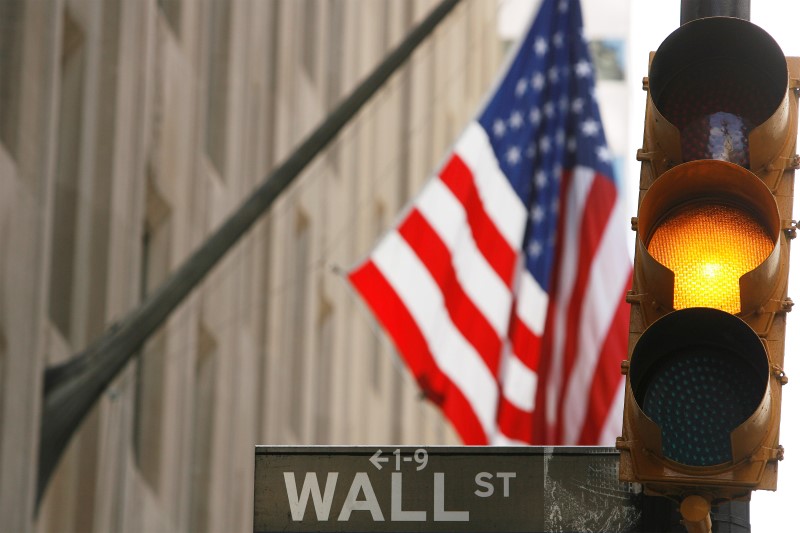
U.S. stock index futures steadied on Monday evening after a mix of bargain buying and some positive economic data helped Wall Street mark a two-day rebound from correction territory.
But gains were limited amid caution before a Federal Reserve meeting this week, while investors were also awaiting more cues on artificial intelligence from Nvidia’s developer conference.
Caution over President Donald Trump’s plans for more trade tariffs continued to weigh, as Trump warned that more duties will be imposed by April 2.
But risk appetite took some support from chatter over a Russia-Ukraine ceasefire, with Trump set to speak to Russian President Vladimir Putin on Tuesday.
S&P 500 Futures were flat at 5,732.25 points, while Nasdaq 100 Futures steadied at 20,035.25 points by 19:29 ET (23:29 GMT). Dow Jones Futures steadied at 42,231.0 points.
Fed meeting front and center
Investors were focused squarely on a two-day Fed meeting- which begins on Tuesday- for more cues on the economy and interest rates.
The central bank is widely expected to keep rates unchanged, and is expected to signal few changes amid sticky inflation and heightened uncertainty over the economic impact of Trump’s policies.
Still, some signs of cooling in the labor market could push the Fed into softening its hawkish stance, as could growing speculation over a U.S. recession.
Nvidia developer conference awaited
NVIDIA Corporation (NASDAQ:NVDA) steadied in aftermarket trade following a 1.8% loss during Monday’s session.
The chipmaker was nursing heavy losses over the past month, as broader market sentiment soured, and as investors questioned just how much strength there remained in the AI trade amid increased market turmoil. Nvidia was trading down about 20% from its January record high.
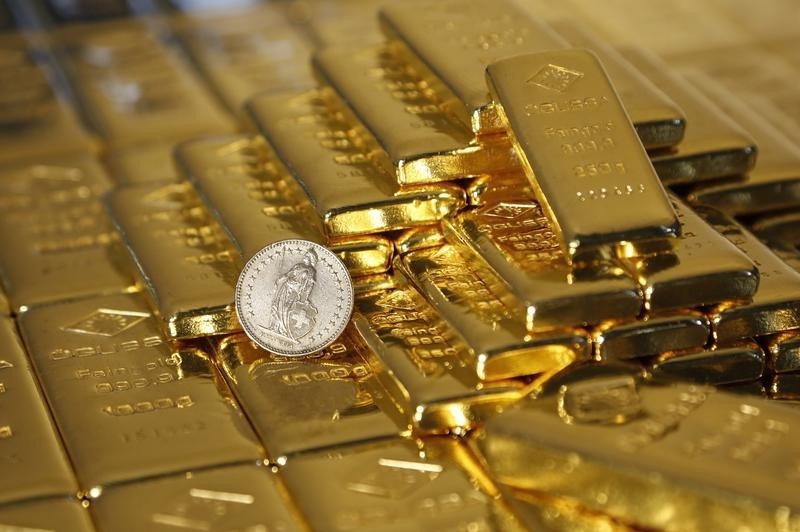
Investing.com-- Gold prices fell slightly in Asian trade on Monday after racing to record highs, as safe haven demand remained underpinned by uncertainty over trade tariffs and a slowing economy.
Haven demand was also boosted by increased geopolitical ructions in the Middle East, after the U.S. launched a wave of air strikes on Houthi rebels in Yemen in retaliation for their attacks on shipping lanes in the Red Sea.
But this trend was undermined by some signs of progress in Russia-Ukraine ceasefire talks, with President Donald Trump stating that he will speak to Russian President Vladimir Putin on Tuesday.
Gold also saw some profit-taking after reaching record highs above $3,000 an ounce last week.
Spot gold fell slightly to $2,982.80 an ounce, while gold futures expiring in April fell 0.3% to $2,991.62 an ounce by 01:14 ET (05:14 GMT). Spot prices hit a record high of $3,005.08 an ounce on Friday.
Tariffs, economic jitters keep gold strong
Trump on Sunday evening repeated his threats of reciprocal and sectoral tariffs being imposed on April 2- a move that is widely expected to escalate a brewing global trade war.
But markets were uncertain over just how much Trump will commit to the tariffs, given that he had earlier this month flip-flopped on measures against Canada and Mexico.
Still, the two countries, along with China and the European Union, outlined retaliatory measures against the U.S., and are expected to impose even stricter measures against Trump’s reciprocal tariffs.
Fears of trade-related disruptions and a potential tariff-driven bump in inflation drummed up fears of a U.S. recession.
Haven demand was also furthered by anticipation of a barrage of central bank meetings this week, most notably the Federal Reserve, Bank of Japan, and the Bank of England.
U.S. industrial production and retail sales date is also set to provide more cues on the world’s biggest economy.
Other precious metals were a mixed bag after clocking strong gains in recent sessions. Platinum futures rose 0.5% to $1,018.0 an ounce, while silver futures fell 0.3% to $34.328 an ounce. Silver prices briefly touched a five-month high.
Copper steady with China stimulus in focus
Among industrial metals, copper prices steadied on Monday with focus squarely on more stimulus measures in China. Expectations of more support from Beijing had spurred a strong run-up in copper prices over the past month.
Benchmark copper futures on the London Metal Exchange rose 0.1% to $9,805.40 a ton, while May copper futures were flat at $4.8950 a pound.
Sentiment over China- the world’s biggest copper importer- was boosted by Beijing announcing a host of measures to boost private consumption. Stronger-than-expected industrial production data also aided sentiment.
Copper was also boosted by Trump flagging plans to impose 25% tariffs on all copper imports- a move that could severely tighten physical supplies in the U.S.

ABOARD AIR FORCE ONE (Reuters) -U.S. President Donald Trump said he has no intention of creating exemptions on steel and aluminum tariffs and said reciprocal and sectoral tariffs will be imposed on April 2.
Last month, Trump raised tariffs on imports of steel and aluminum to a flat 25%, without exemptions or exceptions, in a move that was designed to help U.S. industry while contributing to an escalating trade war.
Speaking to reporters on Air Force One, Trump said reciprocal duties on U.S. trading partners would come alongside auto duties.
"In certain cases, both," Trump said when asked if he would be imposing sectoral and reciprocal tariffs on April 2. "They charge us, and we charge them. Then, in addition to that, on autos, on steel, on aluminum, we’re going to have some additional," he said.
Trump has said previously that he would impose reciprocal tariffs on U.S. friends and foes alike at the beginning of April.
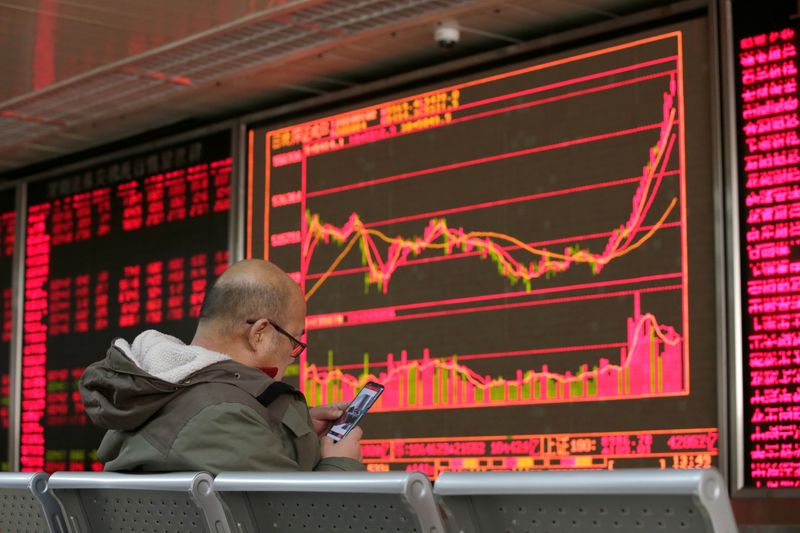
Investing.com-- Asian stocks rose on Monday tracking optimism over the Chinese economy after Beijing outlined targeted measures to boost spending, although persistent concerns over a U.S.-led trade war kept gains limited.
Regional markets also took a positive lead-in from a Friday rebound on Wall Street, although the rebound appeared to have petered out with U.S. stock index futures falling in Asian trade.
Persistent concerns over U.S. trade tariffs and slowing growth undermined overall risk appetite, as did anticipation of a barrage of key central bank meetings this week, particularly the Federal Reserve and the Bank of Japan.
Barring China, most Asian markets were nursing steep losses over the past month, amid heightened concerns over U.S. trade tariffs and a potential recession.
Chinese stocks buoyed by more stimulus cues
China’s Shanghai Shenzhen CSI 300 and Shanghai Composite indexes rose marginally, while Hong Kong’s Hang Seng index surged as much as 1%.
Sentiment towards the country was boosted chiefly by Beijing unveiling “comprehensive” measures aimed at boosting domestic consumption and driving up economic growth.
A report from the State Council outlined a plan to strengthen consumer demand by increasing wages, offering more subsidies and also increasing social welfare.
The planned measures are more promises from Beijing to boost sluggish private spending- which has been a major point of pressure on the Chinese economy over the past four years.
Data on Monday showed Chinese industrial production blazed past expectations in the first two months of 2025, while retail sales grew as expected. Fixed asset investment grew more than expected, while China’s unemployment rate unexpectedly rose.
Optimism over more Chinese stimulus and the country’s artificial intelligence capabilities drove a stellar rally in local markets so far in 2025, although a bulk of buying was directed towards Hong Kong.
A key Chinese loan prime rate decision is due later this week.
Japan’s Nikkei surges with BOJ in focus
Japan’s Nikkei 225 index added 1.1%, while the broader TOPIX index rose 1.2%.
Focus this week is squarely on a BOJ meeting, with the central bank widely expected to keep interest rates steady at its conclusion on Wednesday.
But investors will be watching for any commentary on the BOJ’s plans to hike interest further this year, amid signs of sticky Japanese inflation, rising wages, and positive economic growth.
Broader Asian markets took positive cues from China, with Australia’s ASX 200 index rising 0.6%. But the index did trim some gains after Treasurer Jim Chalmers flagged higher inflation and slower economic growth due to the impact of Cyclone Alfred.
Singapore’s Straits Times index rose 0.7% following mixed export data. The country’s key non-oil exports grew more than expected in February from the prior month, but year-on-year growth still missed expectations.
South Korea’s KOSPI rose 1.4% on bargain buying into major technology stocks. But sentiment towards the country remained strained before a key court ruling on impeached President Yoon Suk Yeol over his attempt to impose martial law in December. Anticipation of the decision- which is due this week- sparked mass rallies across South Korea.
Futures for India’s Nifty 50 index pointed to a mildly positive open, as the index nursed sustained losses since late-2024. Indian wholesale inflation data is due later on Monday.

